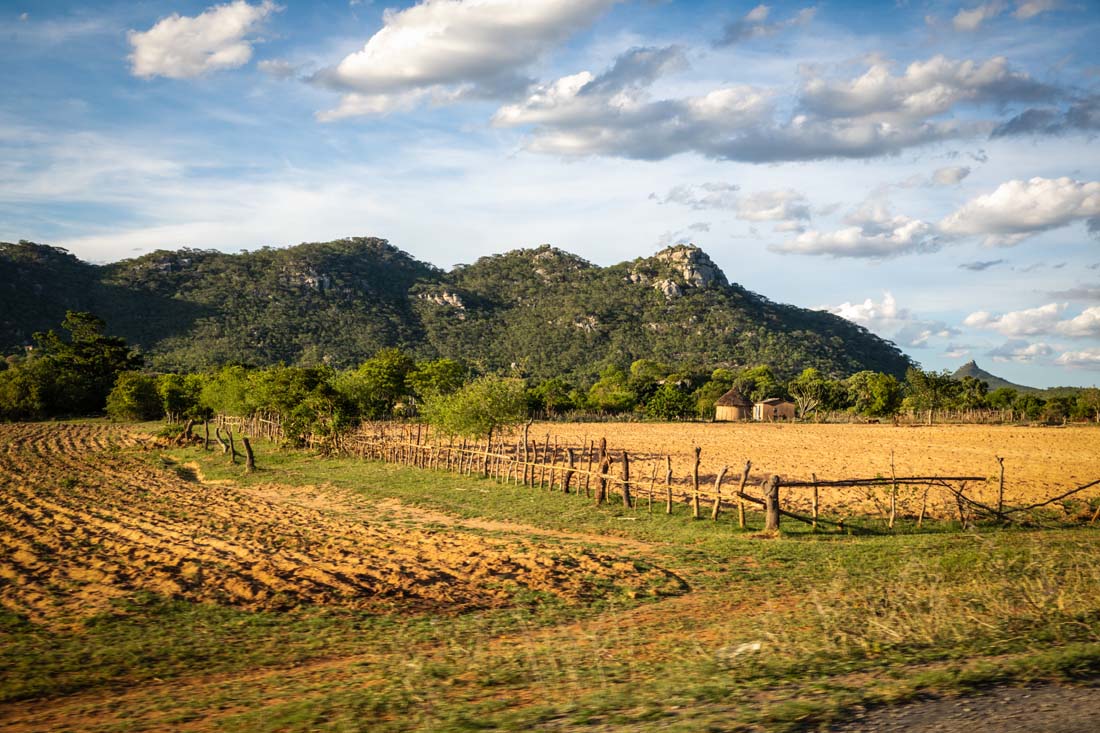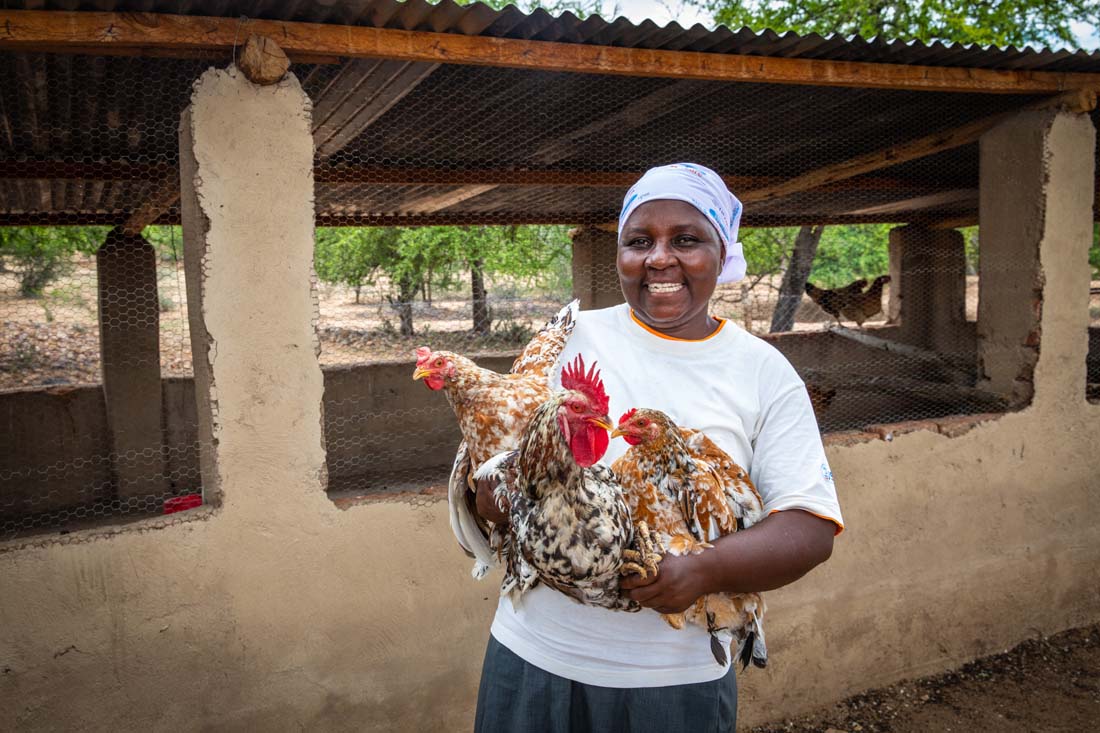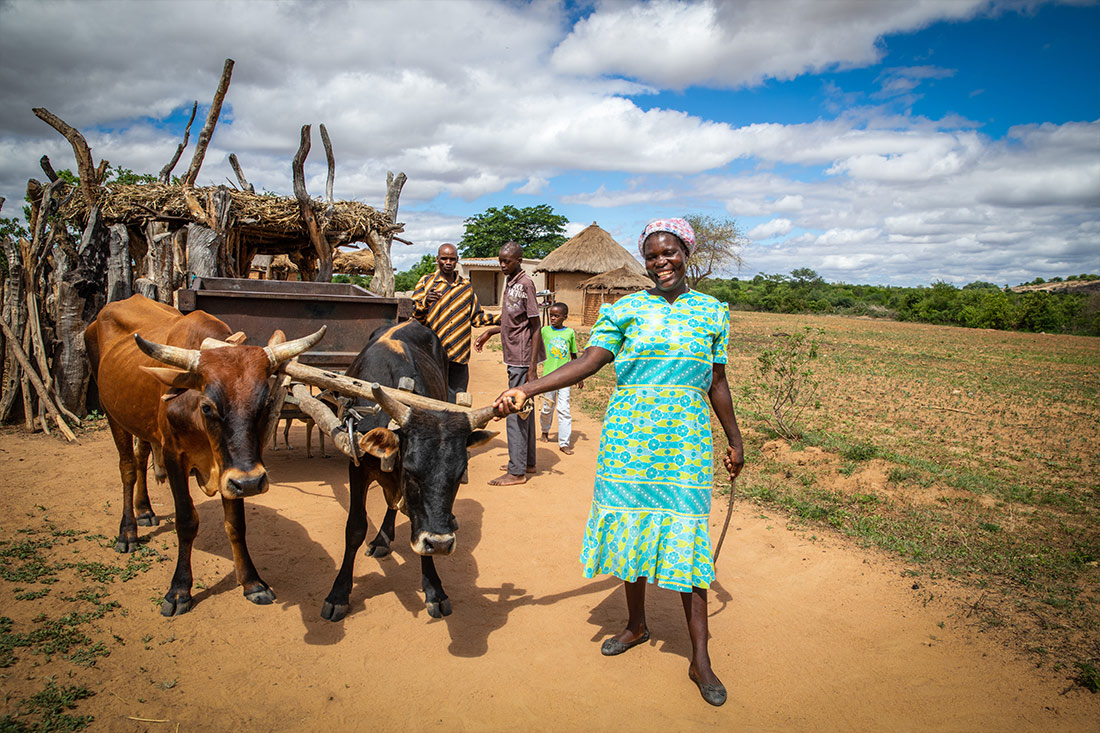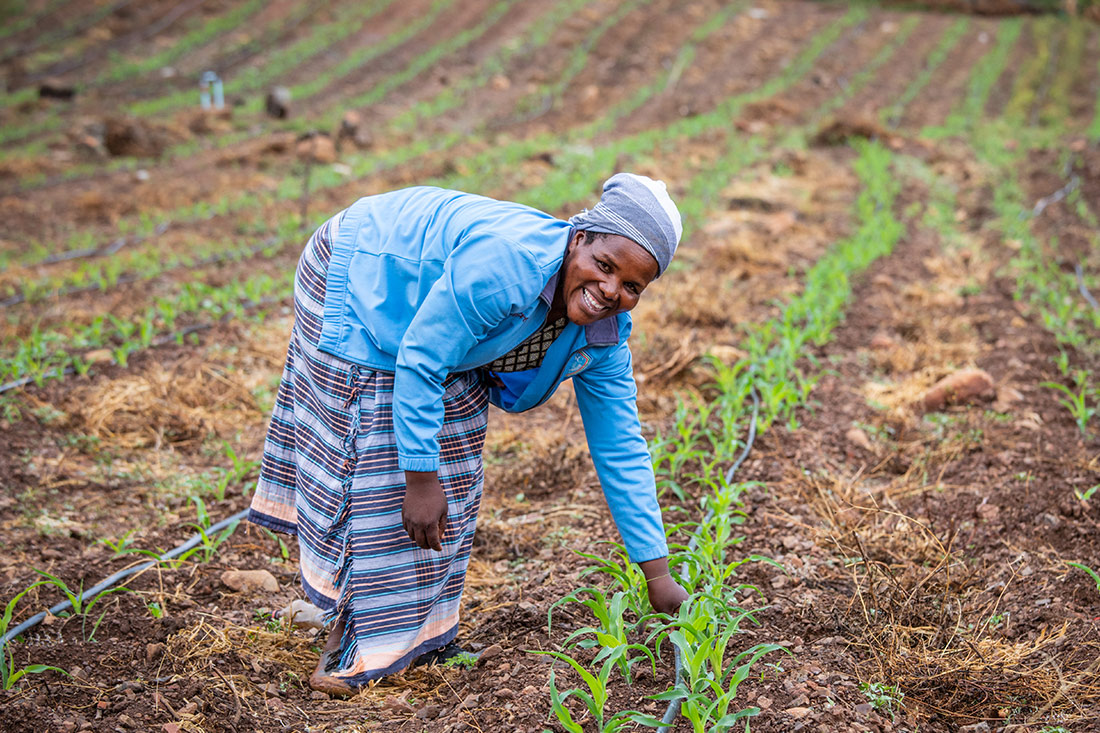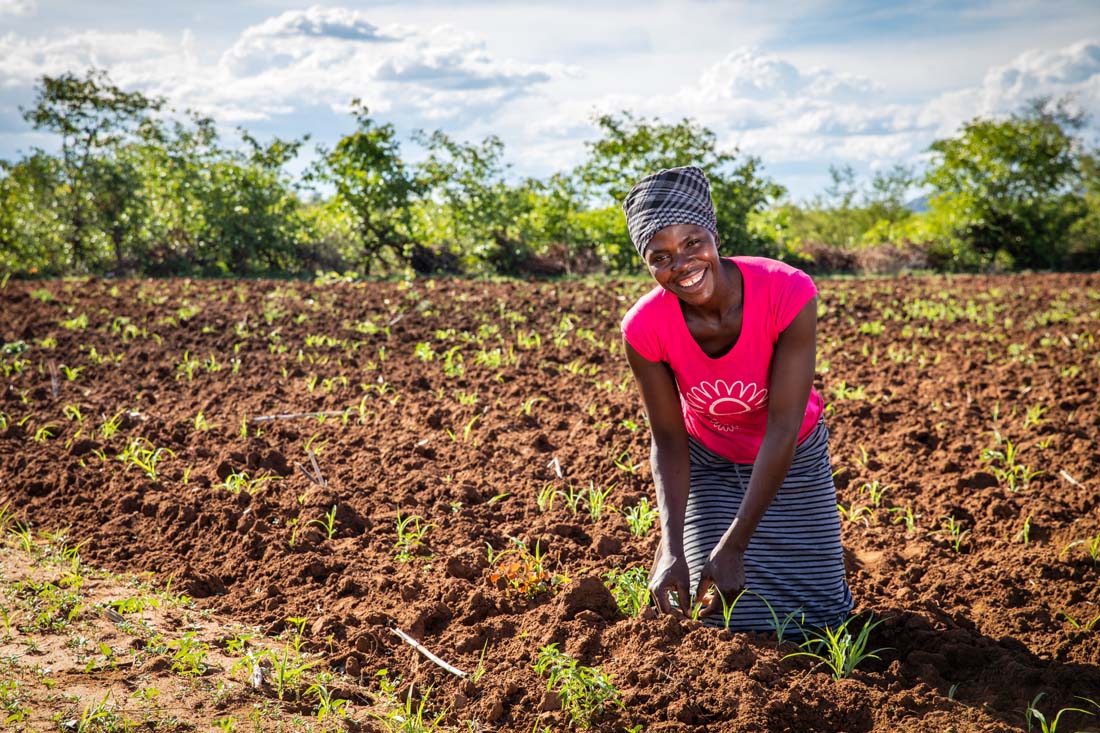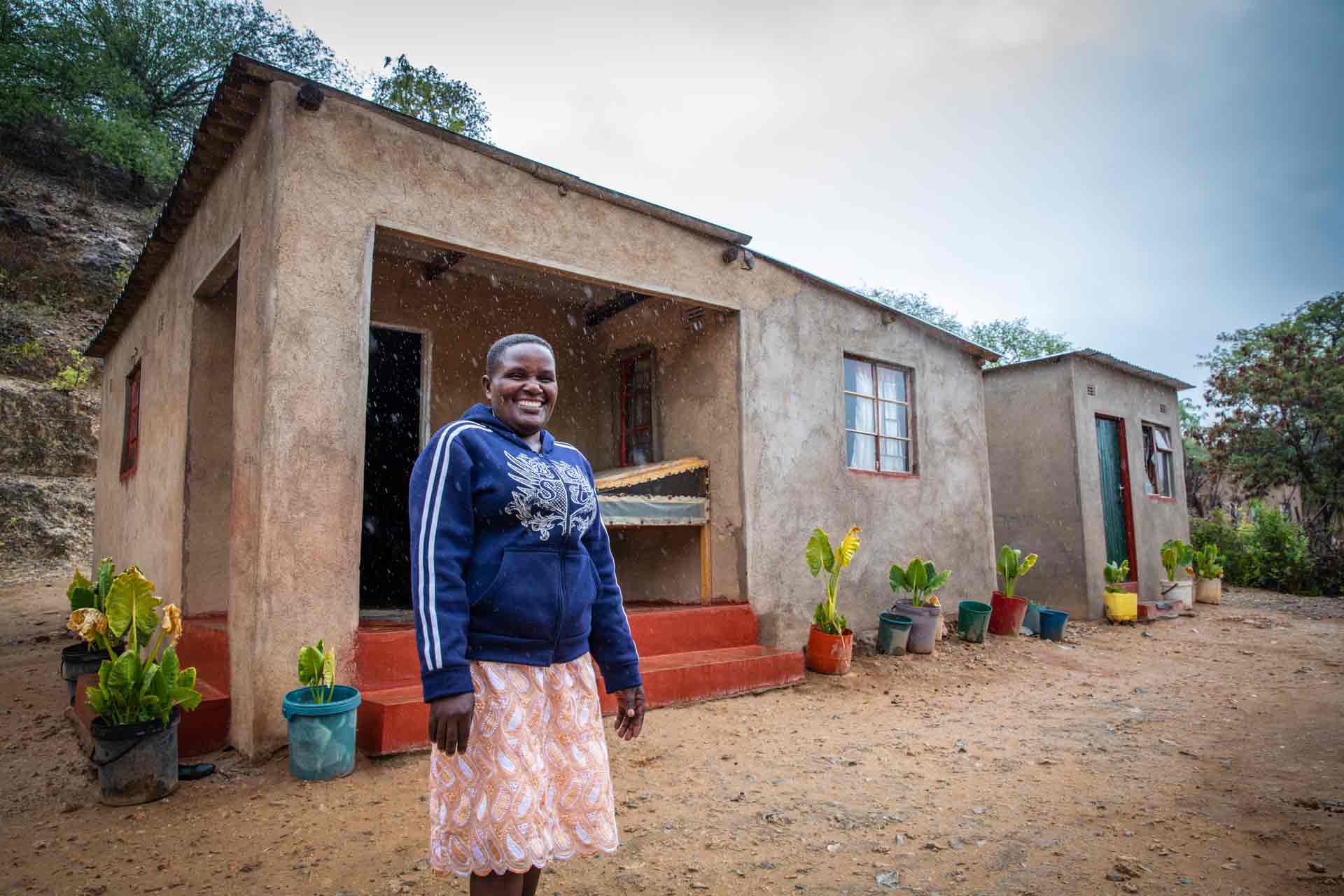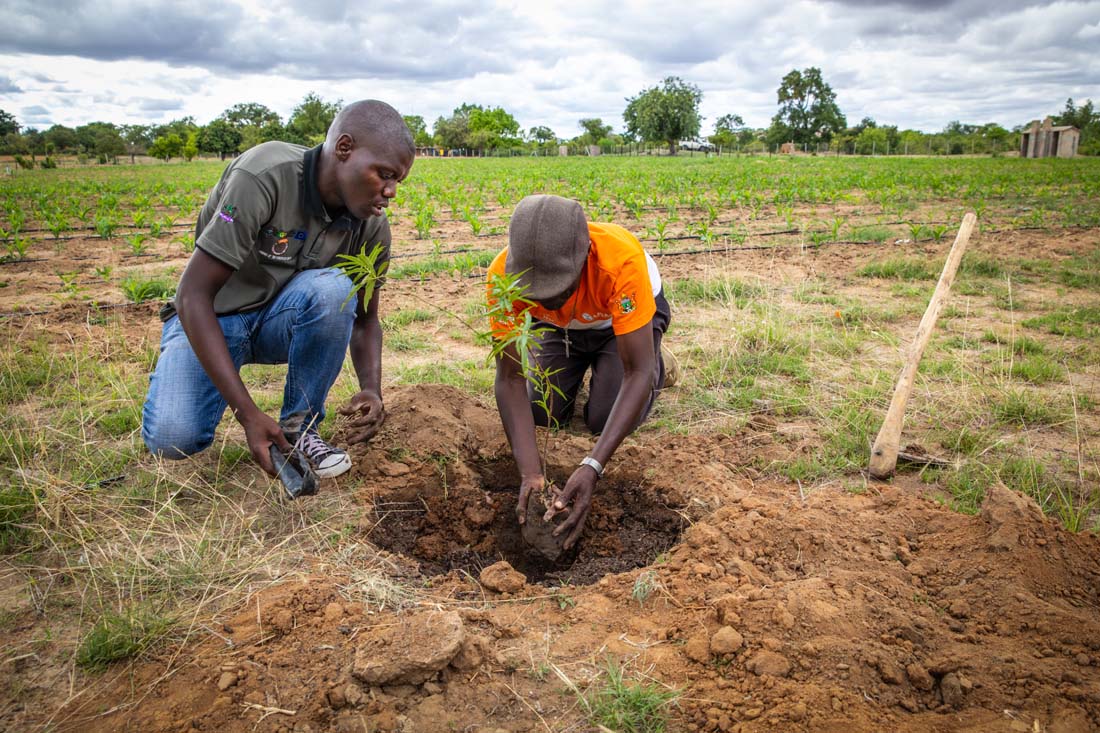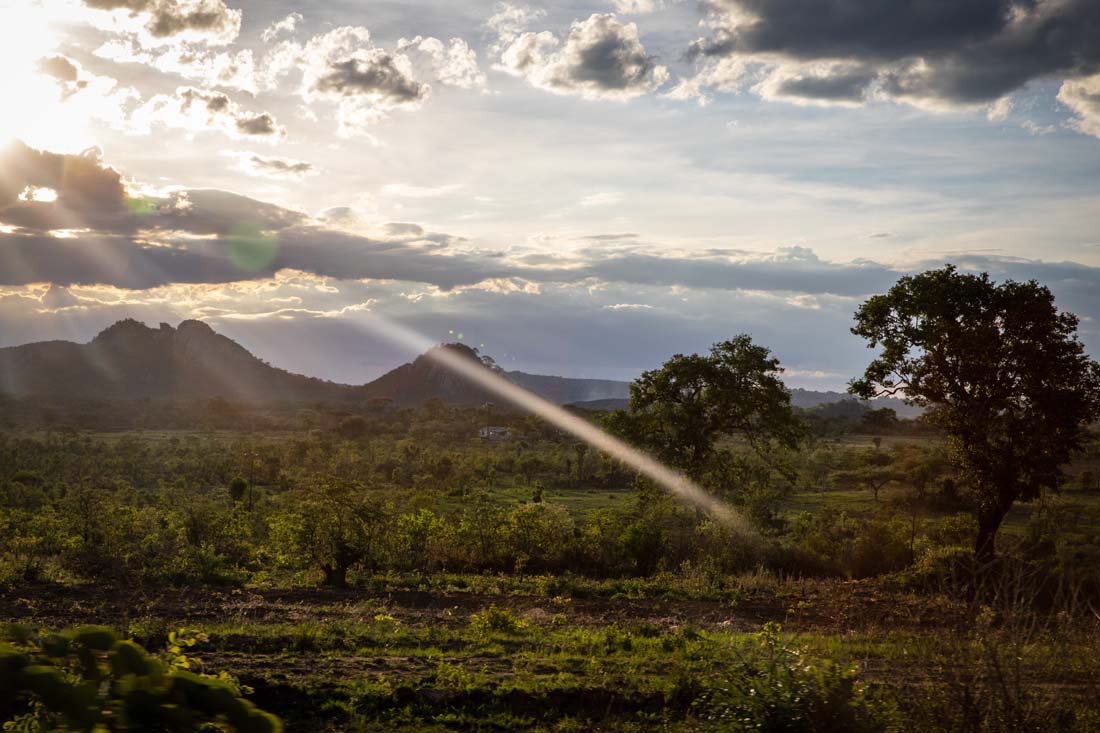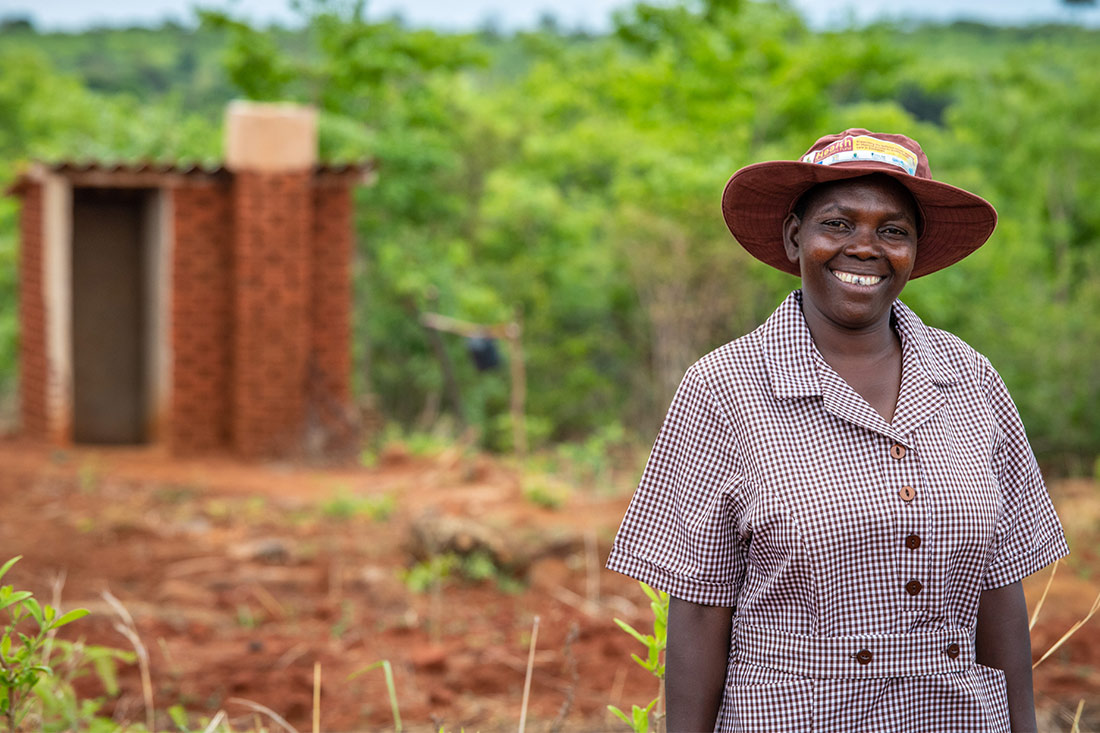
‘I feel like a champion’: A woman’s story of empowerment
Story by Kristy J. O’Hara-Glaspie | Photos by Chris Huber
Gertrude Jimu had had enough. She packed her bag, determined to leave her husband’s home and return to her parents’ house.
The 43-year-old grew up in Masvingo province in eastern Zimbabwe, and she moved north to Manicaland province’s Chimanimani district when she married Thomas Denhe in 1997. This part of the country — the eastern highlands — is filled with mountainous highs complemented by valley lows that stretch 186 miles along the border with Mozambique. Like the terrain surrounding her, Gertrude’s own life had seen its highs and lows, but now she was stuck in a low.
“I admit that it was very difficult,” she says. “I was very poor.”
The couple had three children together, but Thomas had struggled to find work in the area, so like many of the men in this part of Zimbabwe, he moved to South Africa to find work to support his family. He was able to get a job working as a security guard and initially would send about US$50 home each month. Gertrude would stretch it as far as she could to provide for her children, but it was never enough.

“The cash was not that easy to come by,” Gertrude says. “It was difficult to get. I used to wait for my husband to feed the family. I also used to wait for my husband to buy livestock like goats and chickens, and I waited for my husband to build the house.”
He would return every two months, but his arrivals weren’t happy reunions.
“We used to quarrel a lot, especially when it comes to financial matters,” she says. “Even just a few dollars to buy salt, we would fight over that.”
In the meantime, her children suffered. She struggled to pay school fees and provide food for her three children. The family usually ate, at most, two meals a day, and rarely was the food nutritious. Her oldest frequently had diarrhea. She could also tell he wasn’t healthy, as his legs seemed very small for his age.
“I was so scared,” she says. “I would spend the whole day crying, to one point I was admitted to the hospital due to that fear. I was scared.”
As time went on, Thomas’ visits became less frequent, and she became more desperate. By 2015, it had been more than a year since she last saw him, and she feared he had settled down with another family. She felt like she had nothing.
“I even wanted to pack my bags and go back to my parents due to our misunderstandings,” she says.
But while she was preparing to return home, Theogina Mutete, a World Vision staff member working in the community, encouraged Gertrude to stay.
Theogina told Gertrude, “You have to stay and use your brains and use your hands — we will teach you!” Hesitantly, Gertrude listened and decided to stay.
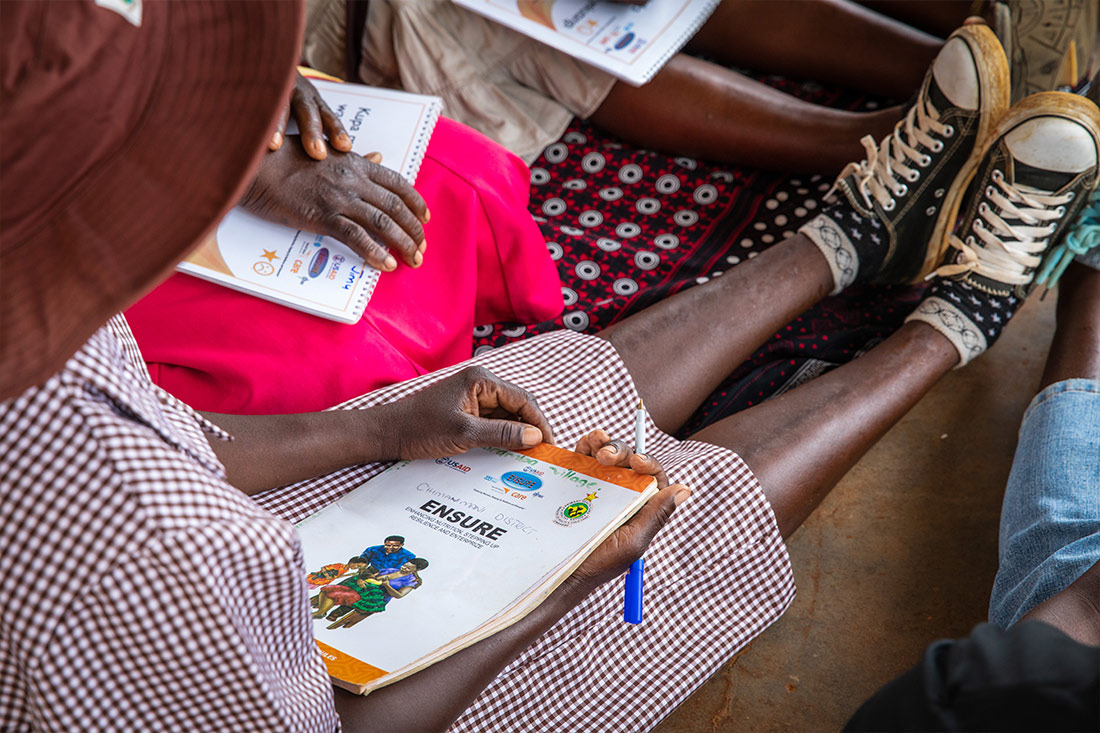
Joining a savings group
Theogina facilitated savings groups in Chimanimani through World Vision’s ENSURE program, a USAID-funded program aimed at increasing livelihoods, food security, and nutrition across both Manicaland and Masvingo provinces. Savings groups teach people living in poverty, who otherwise wouldn’t have access to banking services, how to collectively save, loan, and pay back money, and set long-term financial goals.
Members create group bylaws and each contribute an agreed-upon sum each month. In turn, they can take out loans from the group fund to pay for expenses and business ventures, while paying it back with interest on a timeframe that’s also agreed upon by the savings group. World Vision had begun implementing these groups in the region in 2014. In 2016, Gertrude finally joined one.
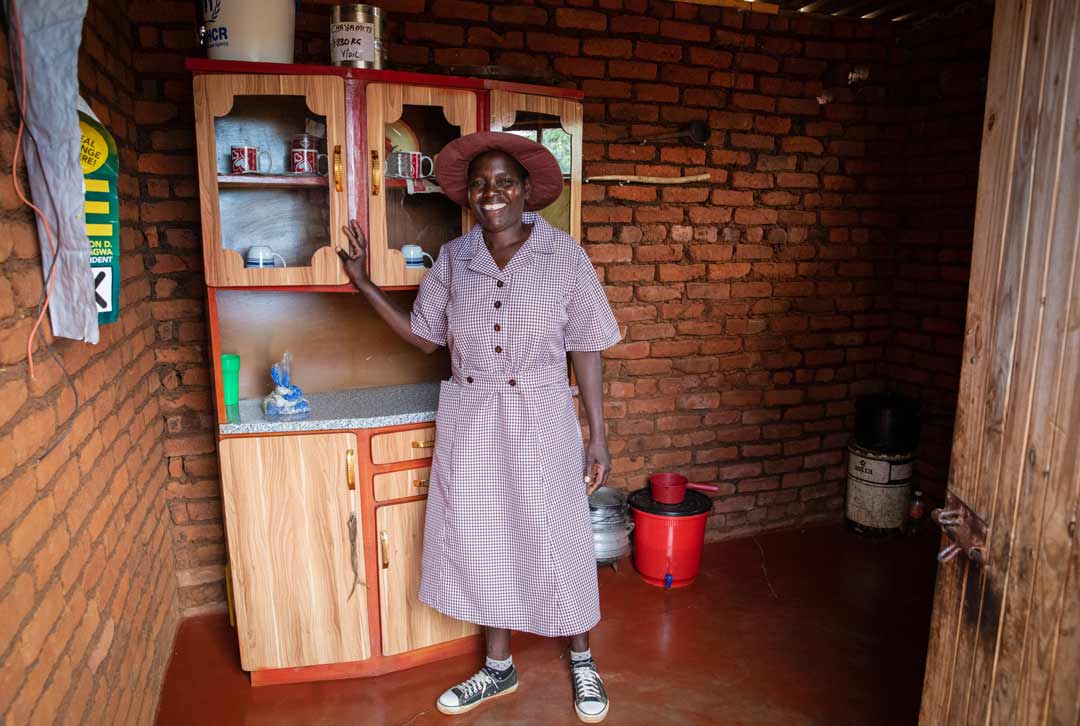
“The reason I delayed joining the VS&L (Village Savings & Lending) was out of skepticism, and I lacked knowledge,” Gertrude says. “We were fitted with adequate information from ENSURE, so I accepted the information. ENSURE was the one that motivated me to do it.”
Every six months, group members would share their results at a share-out, where each member receives a portion of the pooled savings. ENSURE encourages group members to use their first share-out to buy something big — something tangible they can display at their home that will serve as a reminder and encouragement for them to continue saving. Gertrude decided to buy a wardrobe.
Leading care groups
Since 2002, Gertrude had been volunteering as a community caregiver — a position the community elected her for. In that role, she was responsible for 105 households in her community, and each month she would travel on foot to visit at least 20 of them. During her visits, she would check on basic health needs and treat any basic conditions she had supplies for. If someone was in need of medicine or more serious care, she would encourage them to visit the health center. Her own experiences as a mother dealing with her children’s health issues motivated her to give back and help other moms.
“That fear, due to the experience that I once encountered, that’s where my strength lies, and I can manage to assist women in the same situations,” she says.
In 2016, the same year she joined the savings group, Gertrude’s community honored her further by electing her as a village health worker. Now she was responsible for 160 households, but it’s a lot of work for one person, or even a few. So ENSURE introduced care groups in Chimanimani.
“The village health care worker was the only person charged with the entire village, and our villages are big in terms of geographic spread,” says Richard Ndou, who has served as chief of party overseeing the ENSURE program. “That person was finding it hard to reach out to everyone because of the spread of the villages. With this model, we were able to reach a lot more people.”
As a village health worker, Gertrude oversaw the care groups, which teach many valuable lessons vital to improving maternal and child health. Pregnant women learn how to care for themselves as well as their babies before they are born as well as after. They learn about the importance of exclusive breastfeeding through 6 months of age and the need to add nutrient-rich foods, like peanut butter, to porridge when solids are introduced so that children get a better-balanced diet. The groups also teach about safe water, sanitation, and hygiene practices that can lead to improved health for families and children.
The care groups meet monthly, and at meetings children are weighed and monitored to ensure they are not malnourished. Group leaders also make monthly house calls for ongoing observation. During the home visits, leaders encourage women to have nutrition gardens at their home, where they can produce small amounts of vegetables that can be mixed with porridge to also provide extra nutrients for their children.
“My work was very difficult before the care groups,” Gertrude says. “I attribute the difficulties to diarrhea. There was a high prevalence of diarrhea, especially in children. I would wake up several times in the evening trying to assist children suffering from diarrhea. But now the diarrhea cases have decreased, so it makes my job easier. I’m so delighted!”
Additionally, the rate of stunted children under age 5 has decreased by 8.4 percentage points in ENSURE communities over the life of the program. “That’s one of the biggest stunting reductions I’ve ever seen,” Richard says. He adds that that evaluation is population-based and not only among people participating in the program, which means women attending the care groups are sharing the knowledge they learn with others.
Rudo Marehwa works as a nurse at Chayamiti Regional Health Centre in the community. “Malnutrition is becoming less; it’s getting down,” Rudo says. “I feel happiness because the health education has been done in the community because of that program ENSURE.” When patients come in, she can often tell which ones are participating in care groups because their children are generally healthier, and they have a higher baseline health knowledge. She says, “You are lessening our job at the clinic!”
During home visits, care group leaders and village health workers also focus on teaching men new mindsets.
“For the lessons, we normally encourage women to do early registrations for their pregnancy,” Gertrude says. “We also encourage the husbands to accompany their wives for registration and for seeing the nurses. We also encourage the males to assist their wives during the pregnancy as well as during their lactating, so they assist to do some of the work in the homestead.”
Gertrude’s efforts are working to change centuries of regional patriarchal mindsets that believe men aren’t supposed to help with housework or the children. The ENSURE program has aimed to change these mindsets, so men learn how when they help their wives, it can create more peace and love in their marriage and home.
“The community is cooperative, and also due to the increase in the number of care groups, my work is now easy because they can now see as many people as possible,” Gertrude says. In 2018, UNICEF donated bicycles to the ministry of health, which in turn gifted Gertrude with a shiny blue bike to help make her monthly visits easier as well.

Connecting the groups to amplify change
Women often first get connected to a care group when they are pregnant, but through the care groups, leaders like Gertrude then encourage the groups to become savings groups as well. She likens the bonds created in the groups to that of a family.
“They do it as a family, so they share common interests because they are working as a family,” Gertrude says.
With that kind of trust and bond created, the women are able to rely on each other more easily as they expand into a savings group. This also helps them get a more well-rounded experience through ENSURE’s programs.
“It is very important for someone who is in a care group to join a VS&L group,” Gertrude explains. “The reason being, the money that is obtained from the VS&L group can also be used to complement some of the activities that are done under the care groups.”
For example, a woman may be able to use her savings to invest in better seeds or different crops that can provide better food for her children. Or she may be able to invest in livestock, which can help provide eggs and milk for her children. For Gertrude, she was able to take some of the sanitation lessons she learned through her care group and combine them with the money she earned in her savings group to build a latrine on her property.
“Someone who is in both groups rather than someone who is in a single group [can have a better life] because someone who is in both groups has a wide knowledge base and has vast knowledge obtained from both groups,” Gertrude says. “Someone in VS&L, they are taught on financial aspects, so if someone is in both groups, they get health issues too. Those in care groups are also taught on how to grow crops in the four food groups. They may not get that if they’re just in the VS&L groups.”
The groups are not only changing individual families’ lives but also rather transforming the entire community. Awonder Mutsengiwa, 48, serves as the ward councillor. He says, “ENSURE improved our lives — our women’s, our men’s, and even our animals’. We’ve been improved so much.”
Awonder also explains that people have many meaningful activities to support themselves now. He says, “Even theft has decreased because more people would be busy, and the poverty even decreased because everyone will be busy.”
He says that the quality of homes has improved, families now have livestock, and they are farming more — thanks to a dam and irrigation system also built through ENSURE — and health has improved. Additionally, many families can now afford the luxury of buying tea to enjoy together and with friends.
“When moving in the ward, there were other families which you see, they were very poor, but now you can see they are better, so there is change,” Awonder says. “Even the other children were very thin. You may think they had malnutrition, but this time you never see anyone [malnourished].”
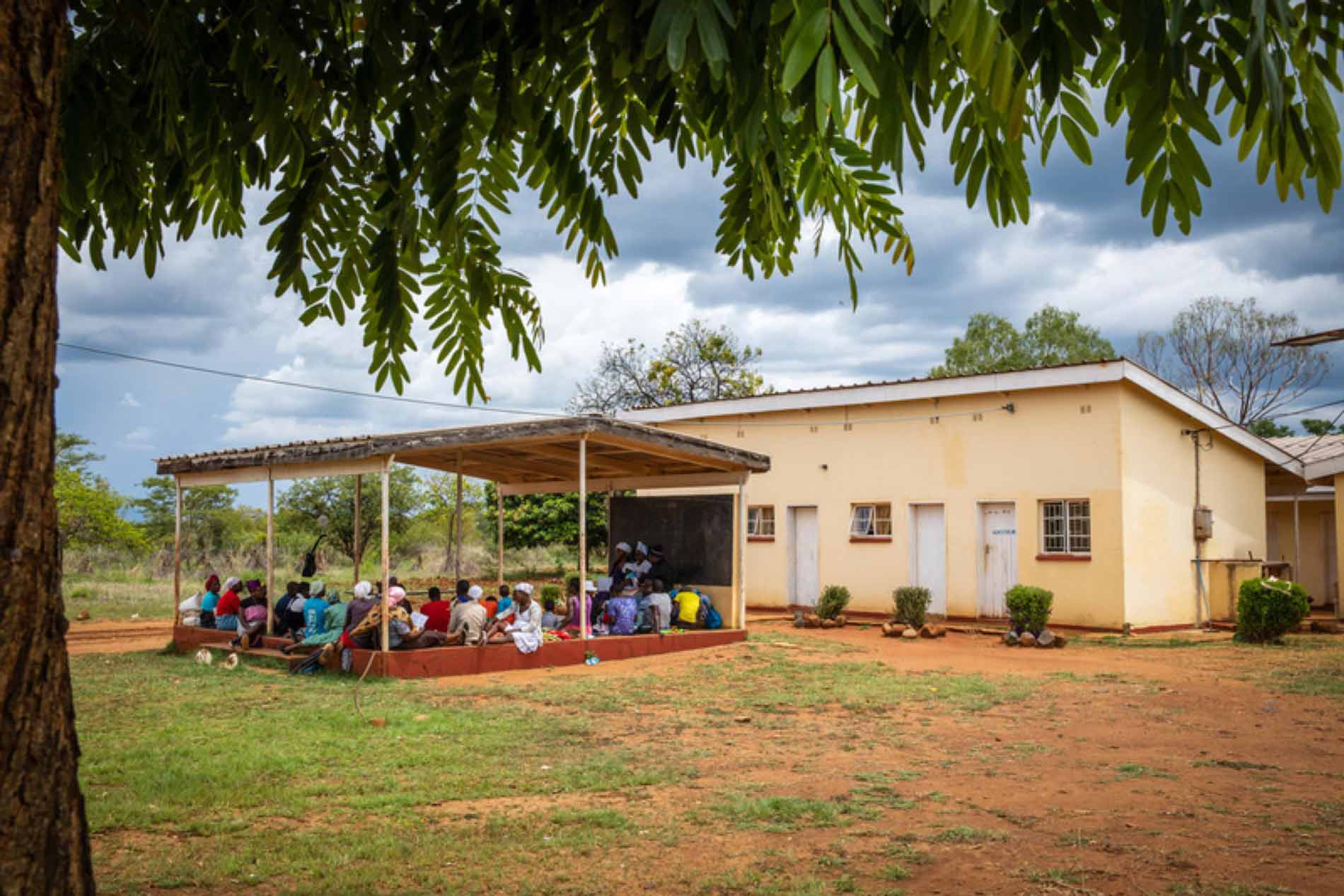

A brighter future
After three years of involvement in both groups, Gertrude’s life has changed. She eventually served as a facilitator for the savings groups as she continued earning more money. She has used her savings to buy roofing sheets, more property, and building materials.
“I realized that almost every year, I must do something tangible,” she says. In 2018, her group had two savings share-outs. With the first, she constructed her two-room, brick house. With the second, she bought two goats. One gave birth to a kid, which is 2 months old now.
She also joined a producer group through ENSURE, where she learned how to care for chickens. Through that and with some of her savings, she was able to buy chickens.

“We are now able to eat meat whenever we want,” she says. She’s planning to sell some of the chicks to help pay school fees for her children.
Hearing of the changes in his wife and homestead, in 2019, Thomas started coming home more frequently. While he still lives away working, the couple is thinking about extending their house’s footprint.
In 2019, Gertrude also used her money from the share-out to buy a kitchen cupboard in the province capital of Mutare, more than 90 miles away.
“My husband was so happy, and he even gave me the money for the transport from Mutare to here!” she says. “He was bragging to his friends and saying, ‘Look at what my wife has done! She managed to buy this cabinet on her own!’ I feel blessed.”
His reaction surprised her, but it also encouraged her.
“I feel so happy and empowered!” Gertrude says glowing. “My husband previously used to look down upon me, but now he has realized I can do much better, and he gives me much assistance.”
Gertrude says the two don’t argue like they used to anymore either and that their relationship has improved.
“At one point, I even wanted to pack my bags and go back to my parents due to our misunderstandings, but currently everything is flowing smoothly,” she says. “We are loving each other and supporting each other.”
Their oldest son is now 21, and he moved down to South Africa to live with Thomas. With another person to support, he isn’t able to send home as much money as he used to, but even with less financial support from her husband, Gertrude doesn’t have the fears and worries she used to.
“I feel like a champion,” she says, explaining that if her husband is able to send home money for food and school fees for their 10- and 15-year-old, that means she can direct her income elsewhere.
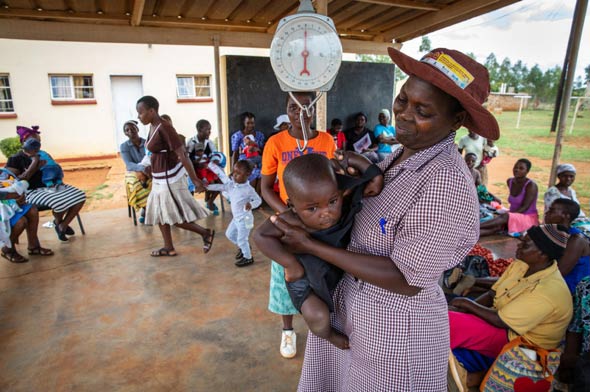
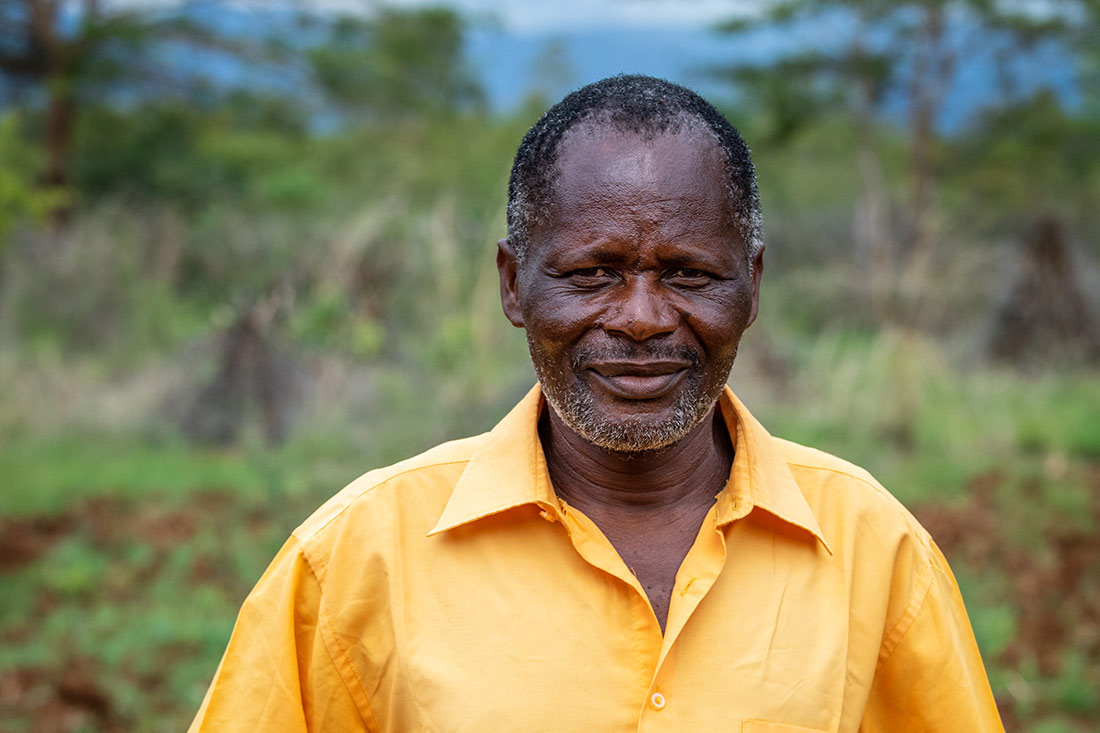
She now supports herself working as a vendor and makes, on a good month, about US$200. She has a small garden that she grows tomatoes and onions in, and she sells some of her produce. If there are products she wants to buy in bulk to sell, such as sugar or paraffin wax, she takes out a loan from her savings group.
Theogina beams with pride as she sees Gertrude at her home. She shares how Gertrude’s life has come full circle and how her attitude has changed. “Now she says, ‘I am here to stay. I’m not going anywhere.’”
Gertrude confirms that she no longer plans to move back with her parents and is committed to lead change in her community ward.
“Previously, women were looked down upon,” Gertrude says. “The community used to consider men as being more influential. Later on, ENSURE motivated us, and we realized the strength in us, so that’s the reason why I’m thriving almost on a daily basis.”
